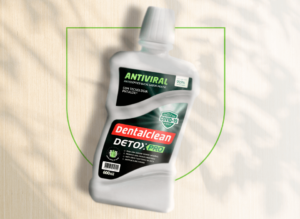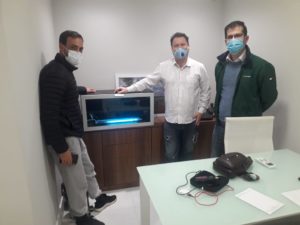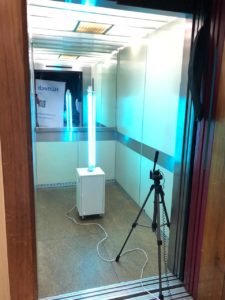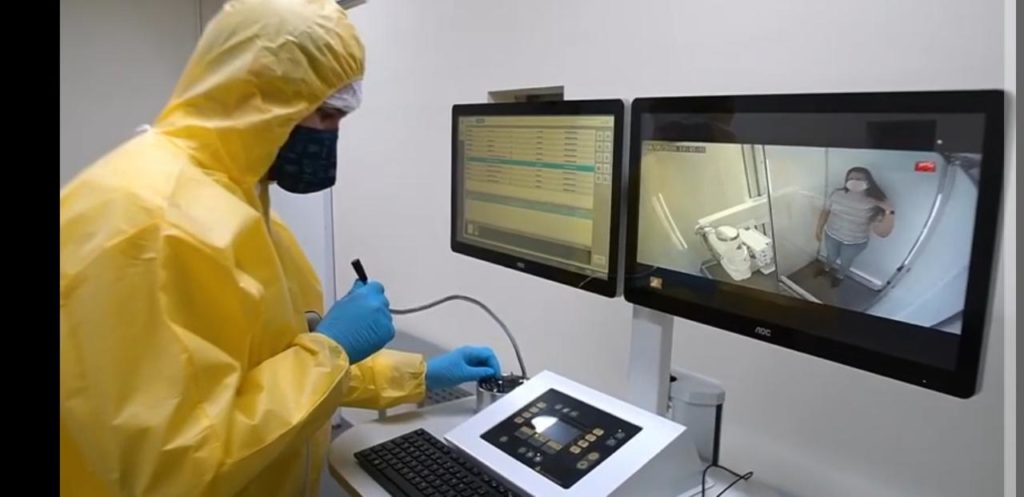São Paulo – Beyond the COVID-19 vaccine race, Brazilian researchers are also trying to find other solutions in the fight against the pandemic that has struck the world throughout 2020 and continues now into 2021. One study resulted in the mouthwash that is able to inactivate the spread of the novel coronavirus in the upper airways in up to 96%. The research was developed by the Dentistry team at the University of São Paulo (USP) in Bauru.
The inactivation is both chemical and mechanical, explains professor Paulo Sérgio da Silva, who answers for the partnership between USP and Bauru State Hospital. Silva points out that the rinse itself helps remove a certain amount of the virus. But in order to expand that, the team changed the focus of another research, which was originally aimed at a antimicrobial action against fungi and bacteria. With the pandemic, though, the professors decided to test the mouthwash against the coronavirus.
The compound responsible for inactivating the virus is derived from phthalocyanine and turned out to be effective against COVID. “At the time, we thought: We need to do something when the virus is in the upper airways,” Silva told ANBA. The researchers found that early in the course of infection, when the virus is still concentrated in the mouth and nose, it’s the ideal moment to minimize the viral load. But the professor stresses: “Of course the product is not a cure. People must keep the basic cares, such as washing their hands, using masks etc.”

The tests with infected patients started in mid-May. In the first stage, 40 people were divided into the group that received the placebo and the group that used the mouthwash. The researchers analyzed how each group behaved during rinse in the first day, then 48 and 96 hours later. The results showed that the mouthwash group saw a decrease in the severity of the disease by the 9th day of infection. Out of them, only one had to be admited at the ICU, and not one died, and the length of hospital stay was cut almost in half compared to the placebo group.
Overall, 61 researchers engaged in the study, which was expanded to include researchers from the Institute of Biomedical Sciences of USP and groups in Londrina, Paraná. The mouthwash is being sold under the name of Detox Pro by Dental Clean, a Brazilian brand that had participated in the research for two years. The researchers are now studying the product’s performance in toothpastes and nasal sprays.
Portable X-ray machine for diagnosis
To fast-track the disease diagnosis, Brazilian company VMI Médica has developed an X-ray that identifies people with evidence of COVID-19 infection. The machine called Apolo D Smartcheck AI was originally developed for mass testing to identify evidence of lung infections and is now being used to identify traces of coronavirus contamination, too. The equipment shows a heat map that quantifies the affected percentage of the lung.
Since it’s portable, the machine can reach places with little infrastructure for diagnosis and difficult to access. Therefore, it could reduce the burden to hospitals and healthcare units. According to the companies, the machine can perform up to 400 tests per day, capturing images in five seconds. An artificial intelligence (AI) function can also be added to the equipment, pointing out evidence of lung infections in up to twenty seconds.
For areas with a low availability of skilled labor, the equipment can also be connected to a network for transmitting images for a remote diagnosis. If it’s done on the spot, the process is carried out by commands in the external area, thus reducing the operator’s exposure. “It’s an effective solution for health systems in any country. The embedded AI gives you the percentage of damage caused by the viral pneumonia – one of the most lethal symptoms of COVID-19, which generally occurs around the sixth day of infection. Based on this, the doctors can hospitalize the patients that have to be hospitalized, thus efficiently organizing the medical resources,” explains Youssef Zeinelabdien, the company’s sales manager.

The X-ray machine has been exported to Indonesia, Bolivia and Mexico. The company operates in Jordan, Egypt, Saudi Arabia, Libya, Sudan, Morocco, United Arab Emirates, Oman, Algeria, Palestine, Kuwait, and Qatar, too. “We have an exclusive distributor in each and every Middle East country,” said Zeinelabdien. The system is used for detecting other ten lung diseases, as well as traumas and fractures.
Equipment for decontamination of surfaces
In the South region of Brazil, a startup has developed a COVID-19 decontamination technology. The company Huttech is based in the Science and Technology Park of the Pontifical Catholic University of Rio Grande do Sul (Tecnopuc). “The UV-C light has been used for years to decontaminate other virus of the coronavirus family. Studies show that it is also effective against the novel virus, and I started using it in my dentist’s office,” the company’s CEO, Eder Hüttner, told ANBA.

From them on, Hüttner decided to use the technology in an ultraviolet product line. “The important thing here is making this technology affordable so that it can reach more people,” he explains on the challenge of making the devices cheaper. He has also tried to get inputs domestically. “Right now, the availability of products such as plastics and lamps is quite unstable. Our goal is using more products made in Brazil,” he said.
The devices include a model for dentist’s offices and a portable tower. For the professor, the newest, however, is the most interesting. “NanoOndas can be used to decontaminate even foods. It’s very similar to a microwave, and the idea is that people can have one at home,” he said. Equipped with a 254-nm UV-C Ondas, the device can inactivate the coronavirus, as well as fungi, bacteria, and other viruses. To use the equipment, though, the buyer must receive training and follow some instructions.
In addition to sell it, the company has donated one UV-C device to an indigenous village near Porto Alegre. “The equipment has been used in the village’s healthcare unit and helped avoiding the spread of the disease. We are also talking to a village in Ceará to donate one to them,” finished the professor.
Translated by Guilherme Miranda




